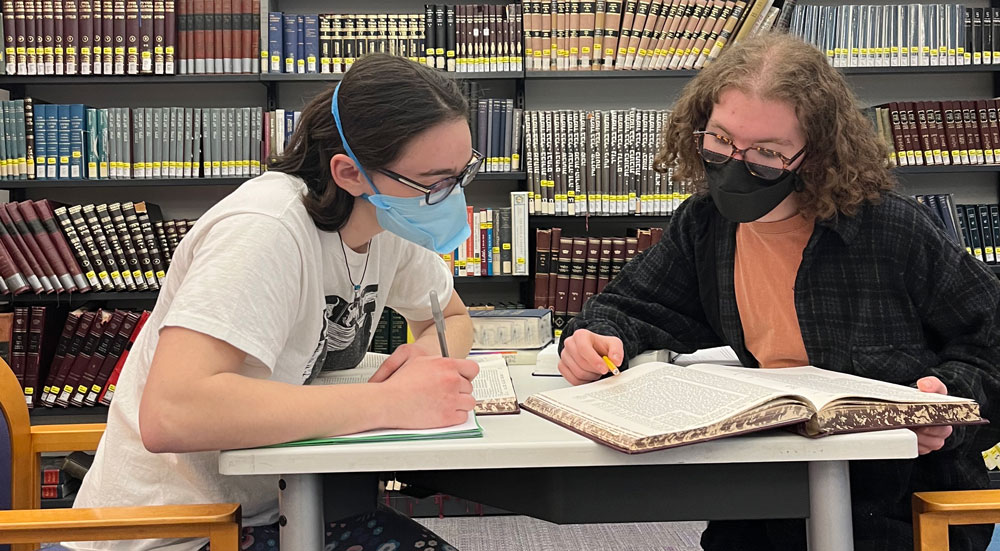Teens The Talmud of Inclusion

For centuries, Jewish students and scholars have learned in pairs known as havruta, and for the past five years, I have been one of those students. Every Tuesday evening, I climb the stairs of the Hebrew College building with a spring in my step, excited to spend the next three hours in my “happy place”: Hebrew College Teen Beit Midrash.
When I walk into the beit midrash, or study space, I am greeted by the sound of many voices excitedly engaging in conversation. Our community of teenagers and educators may be small, but the room is never quiet. As we hang out and eat dinner, we chat about topics ranging from recent U.S. Supreme Court decisions to 16th century cartography to challah recipes. But once we take out our source sheets, Talmud texts, and dictionaries, the discussion shifts. We move closer to our havruta partners and begin to read our study materials aloud, sharing our interpretations. Typically, it doesn’t take long before we come to our first of many disagreements. One of us might argue for a literal interpretation of the text, while the other leans toward a figurative understanding. Or one of us agrees with the Talmudic scholars, but the other prefers a modern reading. We each explain our differing perspectives, backing them up with historical or textual context, rabbinical commentaries, our own experiences, and even current events.
Our debates are similar to those of the rabbis we study. Unlike them, however, we are not expected to reach a definitive answer. We often find consensus on some questions while agreeing to disagree on others. Fortunately, uniting on one answer is not a requirement of havruta learning; our goal is to learn from one another, listen to each other’s perspectives, and respect and appreciate our varying opinions. When we achieve these goals, we not only learn more, we also form a strong community in which all voices are heard and embraced.
This community has been a central part of my life since I joined Teen Beit Midrash in eighth grade. Because I was the youngest and least experienced member, the older students quickly became my role models and mentors. They taught me many of the skills I would need to analyze original Talmudic texts, like how to translate Aramaic. They encouraged me to participate and engage fully without being afraid to ask for help or make a mistake. Perhaps most importantly, they inspired me to find joy and pride in my queer identity.
Before joining Teen Beit Midrash, I knew very few out LGBTQ+ people. When I came out as transgender in middle school, I had yet to meet another gender-creative person, and though my communities were generally accepting, I still felt alone. But in the beit midrash, I was surrounded by many queer, Jewish teens. They took me under their wings, supported me, and through our shared experiences and mutual understanding, gave me a sense of belonging. This makes sense: the beit midrash is the perfect environment for those of us who are sometimes marginalized and encounter hostility and disrespect in other parts of our lives. After all, havruta learning centers around listening, openness, support, and respect.
When I walk up Hebrew College’s winding steps each week, I feel proud: I’m proud of the listening and analytical skills I have learned that I apply in practically every part of my life; I’m proud of the ways I have grown, becoming a role model, just like those whom I admired back in eighth grade; and I’m proud and excited to continue walking through the world as a havruta member – carrying on this powerful tradition of deep learning, respect for those who have different perspectives and identities, and unequivocal support and appreciation for one another.


